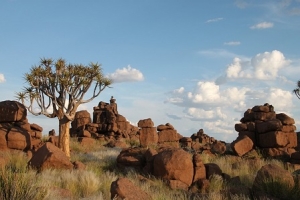 Namibia, previously known as South West Africa, is the driest country in sub-Saharan Africa, and this newly-discovered water source could have a huge impact on the development of Namibia.
Namibia, previously known as South West Africa, is the driest country in sub-Saharan Africa, and this newly-discovered water source could have a huge impact on the development of Namibia.
This is the third major find of a vast aquifer in Africa, a continent plagued by droughts, the two previous both being found in the Lotikipi Basin and the Lodwar Basin in Kenya in 2013.
Life-Saving Vast Aquifer Discovered in Namibia
According to scientists, the water in the newly-discovered aquifer in Namibia could be up to 10,000 years old but is cleaner to drink than many modern water sources and could supply the northern areas of Namibia for around 400 years at the current rates of consumption.
For the approximately 800,000 people of northern Namibia, there is either and excess of water or a shortage of it. They depend on a 40-year-old canal to bring this scarce resource across the border from Angola for their drinking water.
The Namibian government have been attempting to deal with the lack of a sustainable water supply in the area in partnership with researchers from Germany and other EU countries for the past decade, and the identification of the Ohangwena II aquifer, which flows under the boundary between Namibia and Angola, is a welcome discovery. It covers an area of roughly 70 km by 40 km on the Namibian side of the border.
According to project manager Martin Quinger, from the German federal institute for geoscience and natural resources (BGR), “The amount of stored water would equal the current supply of this area in northern Namibia for 400 years, which has about 40 percent of the nation’s population. What we are aiming at is a sustainable water supply so we only extract the amount of water that is being recharged. What we can say is that the huge amount of stored water will always be enough for a backup for an area that is currently supplied only by surface water.
To date, agricultural development has been restricted to areas close to the two rivers on which the region is dependent for its water supply. According to Mr Quinger, the aquifer has huge potential to change the nature of farming in the region, as the water would be well-suited for stock watering and irrigation in the rural areas, and can also augment existing potable supplies as the water was recharged at a time when environmental pollution was not yet an issue.
One thing that could cause problems though is unauthorised drilling, which could threaten the quality of the water by using incorrect methods to extract the freshwater, resulting in the creation of a hydraulic shortcut between the smaller salty aquifer which sits on top of the new find and the fresh water in the deeper one, contaminating it.
A key objective for researchers is to develop young Namibians’ capacity to manage their country’s water resources before the EU funding is exhausted.
Rent water cooler in London from Living-Water. Read our water dispenser blog.





